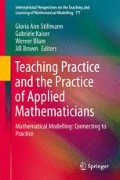Abstract
Evidence has shown that teachers in South Africa often lack the capacity to both connect their mathematics to real-life contexts and struggle to see the internal connections between mathematical concepts. Situating our argument within the ‘critical competence’ and ‘utility’ perspectives, we focus on pre-service teachers’ initial mathematical modelling competencies in a professional development course. Using the notion of modelling competencies with specific reference to the didactic modelling process, we argue that the pre-service teachers’ initial mathematical modelling competencies are at early stages of development.
Access this chapter
Tax calculation will be finalised at checkout
Purchases are for personal use only
References
Blomhøj, M., & Jensen, T. H. (2003). Developing mathematical modelling competence: Conceptual clarification and educational planning. Teaching Mathematics and Its Applications, 22(3), 123–139.
Blum, W., & Niss, M. (1991). Applied mathematical problem solving, modelling, applications, and links to other subjects – State, trends and issues in mathematical instruction. Educational Studies in Mathematics, 22, 37–68.
Brombacher, A. (2003). AMESA submission to the Department of Education on the National Curriculum Statement Grades 10–12 (Schools) and in particular on the mathematics and mathematical literacy subjects statements (pp. 1–12). Johannesburg: AMESA. Retrieved 25th June, 2011, from http://amesa.org.za/Hearing.htm.
Creswell, J. W. (2009). Research design: Qualitative, quantitative, and mixed methods approaches. Thousand Oaks: Sage.
Department of Basic Education. (2011). Curriculum and Assessment Policy Statement (CAPS): Mathematics. Pretoria: Department of Basic Education.
Department of Education. (2003). National curriculum statement grades 10–12 (general): Mathematical literacy. Pretoria: Author.
English, L. D., & Watters, J. J. (2005). Mathematical modelling with 9-year-olds. In H. L. Chick & J. L. Vincent (Eds.), Proceedings of the 29th conference of the International: Group for the Psychology of Mathematics Education (Vol. 2, pp. 297–304). Melbourne: PME.
Geiger, V., Goos, M., & Dole, S. (2013). Taking advantage of incidental school events to engage with the applications of mathematics: The case of surviving the reconstruction. In G. Stillman, G. Kaiser, W. Blum, & J. Brown (Eds.), Teaching mathematical modelling: Connecting to research and practice (pp. 175–184). New York: Springer.
Greer, B., Verschaffel, L., & Mukhopadhyay, S. (2007). Modelling for life: Mathematics and children’s experience. In W. Blum, P. Galbraith, W.-H. Henn, & M. Niss (Eds.), Modelling and applications in mathematics education: The 14th ICMI study (Vol. 10, pp. 89–98). New York: Springer.
Kaiser, G. (2007). Modelling and modelling competences in school. In C. Haines, P. Galbraith, W. Blum, & S. Khan (Eds.), Mathematical modelling (ICTMA12): Education, engineering and economics (pp. 110–119). Chichester: Horwood.
Kaiser, G., & Maaß, K. (2007). Modelling in lower secondary mathematics classrooms – Problems and opportunities. In W. Blum, P. Galbraith, W.-H. Henn, & M. Niss (Eds.), Modelling and applications in mathematics education (pp. 99–108). New York: Springer.
Kaiser, G., & Schwarz, B. (2006). Mathematical modelling as bridge between school and university. ZDM, 38(2), 196–208.
Maaß, K. (2006). What are modelling competences. ZDM, 38(2), 113–142.
OECD. (2003). Mathematical literacy. In Assessment frameworks: Mathematics, reading, science and problem solving knowledge and skills (pp. 23–102). Paris: OECD.
OECD. (2009). Learning mathematics for life: A perspective from PISA. Paris: OECD.
Venkat, H. (2007). Mathematical literacy-mathematics and/or literacy: What is being sought? Pythagoras, 66, 76–84.
Verschaffel, L., De Corte, E., & Borghart, I. (1997). Pre-service teachers’ conceptions and beliefs about the role of real-world knowledge in mathematical modelling of school word problems. Learning and Instruction, 7(4), 339–359.
Yin, R. K. (2009). Case study research: Design and methods. London: Sage.
Author information
Authors and Affiliations
Corresponding author
Editor information
Editors and Affiliations
Rights and permissions
Copyright information
© 2013 Springer Science+Business Media Dordrecht
About this chapter
Cite this chapter
Winter, M., Venkat, H. (2013). Pre-service Teacher Learning for Mathematical Modelling. In: Stillman, G., Kaiser, G., Blum, W., Brown, J. (eds) Teaching Mathematical Modelling: Connecting to Research and Practice. International Perspectives on the Teaching and Learning of Mathematical Modelling. Springer, Dordrecht. https://doi.org/10.1007/978-94-007-6540-5_33
Download citation
DOI: https://doi.org/10.1007/978-94-007-6540-5_33
Published:
Publisher Name: Springer, Dordrecht
Print ISBN: 978-94-007-6539-9
Online ISBN: 978-94-007-6540-5
eBook Packages: Humanities, Social Sciences and LawEducation (R0)

